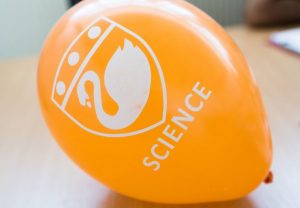Science at Paulet

What do students learn in science in Key Stage 3?
Students will study biology, chemistry and physics topics throughout KS3. These topics provide students with both a wide variety of scientific knowledge and skills, important for not only their GCSE science but also their futures and an interest in the world around them. Topics cover fundamental principles from; plant and animal biology, through to particles, the Periodic Table, electricity and space.
In year 9 students study a term of each of the three disciplines (biology, chemistry and physics). This enables students to consolidate the knowledge they have gained in years 7 and 8, whilst gaining solid foundations in preparation for years 10 and 11.
How do students learn in KS3 science?
Hands on practical work is embedded throughout all topics, from using Bunsen burners, to creating an electromagnet, a fruity battery and a model gut. There are ample opportunities provided for students to get hands on during their time in science.
Students are provided with opportunities to discover new ideas for themselves, they are encouraged to widen their knowledge and deepen their understanding through questioning, discussions, individual and group tasks both as practical and non-practical lessons.
What topics are covered and when in each year group? What is the sequence of teaching?
| Term | Year 7 | Year 8 | Year 9 |
| Cycle 1 | I’m a scientist 1
Movement Cells Particles Separating mixtures Forces (gravity) Energy transfers |
I’m a scientist 2
Breathing and respiration The Periodic Table Electricity and magnetism
|
Biology
Cells Infection and response Circulation |
| Cycle 2 | Variation
Acids and alkalis Speed Energy costs
|
Food and digestion
Chemical reactions Waves
|
Atomic structure and the periodic table
Reactions of metals |
| Cycle 3 | Plant reproduction
Earth structure and universe Work |
Movement
Earth and atmosphere Application of forces |
Energy
Forces |
How are students assessed in KS3 science?
Students are assessed regularly throughout lessons through verbal and written questioning. They are assessed formatively in lessons with written tasks and science practical writeups. End of cycle assessments test knowledge on topics from previous years as well as more recent content.
Home Learning
A variety of homework tasks are set in science, these range from projects spanning several weeks, such as designing a habitat for a pygmy hippopotamus, to online quizzes, revision exercises and exam questions.
Extra-curricular opportunities
Students can explore different aspects of science at science club.
Cultural capital
Science is essential in providing students with cultural capital at KS3. Knowing about their impact on the planet and how their actions affect their bodies and long-term health are examples of how cultural capital is gained in science.
How are careers linked to in KS3?
Science plays an essential role in many different careers. In science lessons we examine a number of different careers that link to the subjects we study. Discussions around the kind of jobs that are involved to make things happen take place as well as qualifications that are needed to study these careers. From helping people with fertility, problems to the safe transport of chemical a plethora of careers are incorporated into the KS3 science schemes of work.
